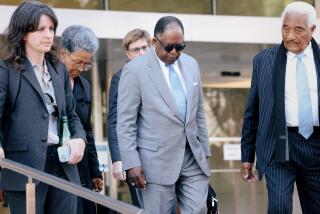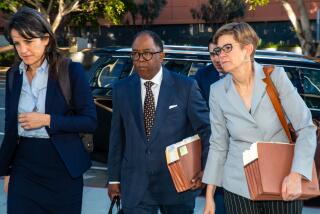Spats Over Instruction Slow Hedgecock’s Trial
After a day in which exhausted attorneys squabbled with each other as they argued over principles of law in Mayor Roger Hedgecock’s trial, Superior Court Judge William L. Todd Jr. will make a second attempt today to break a time-consuming legal logjam so that closing arguments in the case can begin.
Wednesday marked the third complete day in which prosecution and defense attorneys debated proposed jury instructions before Todd --a snail-paced process that, while often tedious or esoteric, is nevertheless crucial because, in the words of Assistant Dist. Atty. Richard D. Huffman, “lawyers often live or die on the instructions . . . they get.”
The prosecution won three important procedural victories during Wednesday’s debate over the instructions, which concern points of law and evidence in the case and will be read by Todd just before the jury begins deliberating. Those victories stem from rulings in which the judge:
- Sided with Huffman on the key question of how perjury should be defined in the case. In his ruling, Todd concurred with Huffman’s contention that, in order to prove that Hedgecock committed perjury, it need only be shown that he knowingly signed an inaccurate campaign financial disclosure statement. Defense attorneys had argued that jurors needed to unanimously agree on which particular campaign contributions were omitted on the forms.
- Agreed to give an instruction proposed by the prosecution relating to other alleged offenses committed by Hedgecock which are not at issue in the trial, but which Huffman wants jurors to consider as evidence that the mayor has a propensity toward covering up illegal political behavior.
- Denied the defense’s request for an instruction based on a state law specifying that the “overhead or normal operating expenses” of a consulting firm made on behalf of a candidate should not be considered political contributions--an argument that is the cornerstone of the defense’s case.
However, a weary Huffman, while clearly pleased with Todd’s rulings, noted at the end of Wednesday’s court session that several major instructions proposed by the defense to be considered today could revive the debate over those major legal issues.
“I am reluctant to think that we have ever dispensed with anything,” Huffman said. “I have seen more resurrections than one would expect at Easter. I’m confident that we’ll see a barrage of instructions in the morning.”
For the second consecutive day, Todd directed Huffman to be prepared to begin his closing arguments, now tentatively scheduled to begin this afternoon. On Tuesday, Todd had told Huffman to be prepared to start his summation speech on Wednesday, but plodding progress on the jury instructions torpedoed that timetable.
Huffman expressed doubt that the two sides will settle their differences over the instructions in time for him to begin his closing remarks today, pointing out that there are “14 more philosophical wars lined up for the morning.”
“But I’m going to plan on . . . being ready . . . because the judge thinks I’m going to,” Huffman said.
However, because Hedgecock’s felony perjury and conspiracy trial is not in session on Fridays, the case will not go to the jury until early next week even if Huffman does start his closing arguments today.
The strain of three full days of complex legal arguments over the instructions was showing Wednesday as Huffman and defense attorneys Michael Pancer and Sheldon Sherman sniped at each other, sometimes seemingly motivated as much by fatigue as by philosophical differences.
At one point, a flustered Pancer said that Huffman had been “talking the most outrageous silliness for the past half hour.” Huffman, in turn, referred to some of Pancer’s legal arguments as “remarkable . . . silliness.”
With Todd acting as a kind of legal editor, seeking alternately to excise improper phraseology from some proposed instructions or to insert key semantical changes in others, attorneys on both sides complained about having to formulate impromptu legal responses on questions that could significantly shape the way jurors view evidence in the case.
After receiving in mid-afternoon a three-page list of specific campaign contributions that the prosecution argues should have but did not appear on Hedgecock’s financial disclosure reports, Pancer asked Todd whether he could have until this morning to prepare a response.
“No,” Todd said.
“Well, I just received it five minutes ago,” Pancer complained. “For the record, I don’t feel I’m ready to respond, but I will.”
“Do the best you can,” Todd said.
Similarly, Huffman complained to Todd that the proposed instructions involved “very substantial matters that could impact the case,” and added, “I want to see it in writing and think about it for more than 30 seconds.”
Todd’s ruling on the definition of perjury to be used in the trial settled--at least temporarily--a critical issue that has been a major point of contention.
The prosecution and defense hold fundamentally different views on how perjury laws apply to the charges facing Hedgecock. Huffman argues that, in order for the jurors to find Hedgecock guilty of perjury, it is sufficient to show that he signed a campaign finance report and “swore that it was true, correct and complete when he knew it was not.”
“The perjury is the false swearing . . . not the specific omissions,” Huffman said.
The defense attorneys, however, contend that prosecutors should have to point to specific alleged unreported contributions and that the jurors, in order to convict Hedgecock, must agree on at least one such illegal donation.
“The jury has to be told what needed to be disclosed but wasn’t,” Sherman said.
Todd issued a two-pronged ruling on the thorny question, requiring Huffman to prepare for the defense a list of specific alleged omissions, but saying that he did not intend to instruct the jury that it had to unanimously agree on the same illegality to return a guilty verdict.
However, Pancer complained that the three-page list prepared by Huffman was “not sufficiently specific” and would allow jurors to “each pick a separate (transaction) out of hundreds” as the basis for their verdict.
“This is so unspecific and so misleading . . . that I’d rather have no instruction than have this one,” Pancer said. Todd granted Pancer’s request that no instruction be given, leaving the prosecution with a major victory on the perjury issue.
The so-called “other offenses” instruction approved by Todd also bolstered the prosecution’s position. Arguing that evidence introduced in the trial has demonstrated that Hedgecock committed conflicts of interests and perjuries not included in the 13 counts facing him, Huffman had asked Todd to instruct the jurors that those other alleged crimes might illustrate “a motive for the commission” of the crimes he is charged with committing.
Pancer, though, protested that Huffman was seeking “merely to show (Hedgecock’s) propensity to commit crimes.”
Todd, however, ruled that the other alleged offenses bear on Hedgecock’s “intent and motive,” and agreed to deliver Huffman’s proposed instruction.
Another of Todd’s rulings undermined one of the defense’s central arguments concerning the operation of Tom Shepard & Associates, the political consulting firm that ran Hedgecock’s 1983 campaign.
Prosecutors have charged that Hedgecock received tens of thousands of dollars in illegal campaign contributions from former J. David & Co. principals Nancy Hoover and J. David (Jerry) Dominelli via Shepard’s firm in the form of free staff time and other unreimbursed services. The perjury charges facing the mayor allege that Hedgecock then intentionally falsified his financial disclosure reports to conceal those transactions.
In response, the defense has argued that those expenses actually involved Shepard’s overhead costs that, under state election laws, are not considered contributions. To reinforce that argument, Pancer had requested that Todd instruct the jurors on a state law specifying that a consulting firm’s “overhead or normal operating expenses . . . on behalf of or for the benefit of any candidate” should not be treated as contributions.
Huffman, however, argued that the defense’s interpretation of that statute would allow political consulting firms to “give away valuable service . . . without consideration.”
After a lengthy debate, Todd sided with Huffman, saying he was “unpersuaded” by the defense’s arguments. However, the judge later agreed with a defense request to give an instruction stating that although Shepard’s firm lost money on the Hedgecock campaign contract, the consultant could have been willing to absorb the financial loss in order to establish the reputation of his fledgling firm by running a successful mayoral campaign.
More to Read
Sign up for Essential California
The most important California stories and recommendations in your inbox every morning.
You may occasionally receive promotional content from the Los Angeles Times.










